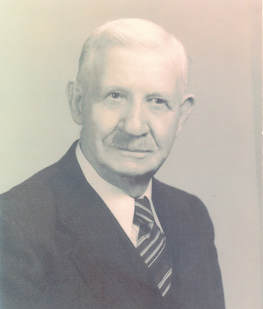A Day in the life...
First hand accounts from our local citizens
|
As printed in the Wichita Eagle, Saturday, November 2, 1935 By VICTOR MURDOCK  GEORGE WASHINGTON MOORE, owner of the Towanda News (newspaper) during the early 1900's. Will this part of the West in the next fifty years produce so much to satisfy adventuring youth as have the last fifty years? George Washington Moore of Wichita and I were speculating on that proposition the other day, and came to no definite answer to the question. But there is a guess that looks good. Certainly this corner of the country in the last half-century offered plenty of adventure. When Moore was a boy in West Virginia, he heard a heap about the West. One relative had done the California gold thing. Another relative, an uncle, had the Union Pacific construction - buffalo - Indian experience, and had come home to tell about it in young George's hearing. So, when he was fourteen, Moore left his fathers 525 acre farm in West Virginia and headed West alone. He landed in Wichita. He put up at the old City Hotel on Market Street and the day after his arrival was told by a man there that if he wanted to pick up some pointers about this country, he might attend and Old Settler's meeting at the Turner Opera House that day and listen. This was in February 1885. Moore went. He sat in the gallery and listened. Near him sat Henry Hudson, a farmer north of Wichita. Hudson made inquiries of the lone youth beside him and asked him to go out on the farm with him. Mr. Hudson told Moore he would have to become acclimated; that this was a different country than West Virginia. Moore drove home with Mr. and Mrs. Hudson. On their way to the farm, Mr. Hudson pointed out to Moore a gray cloud on the northwest horizon and asked Moore if he knew what that was. Moore didn't. Hudson told him it was a blizzard. Moore had never heard of a blizzard before. He found out about blizzards the next day. He went out that morning with Len Hudson, his own age, to feed the stock. When he returned to the house, Mr. Hudson, seeing that Moore had no overcoat, bundled him up, took him to Valley Center, and ordered for him a sheepskin coat, felt boots, mittens, everything, and asked the merchant the amount of the bill. The merchant named the amount and the boy from West Virginia cooly reached into his jeans and to Mr. Hudsons amazement, produced a roll of three hundred dollars. He had brought the money from West Virginia. Moore had always ridden horses in the hills of West Virginia. He found the little bucking western cayuse something new, but he mastered the mustangs, and eventually, upon Mr. Hudson's recommendation, he got a job "riding fence" on a big ranch in the Indian country south of Kiowa. He liked the livestock business. He worked for M.C. Campbell, B.H. Campbell and once for "Sand Hill" Davis. Once he tried farming in McLean county, Illinois, but he liked this part of Kansas best and returned. By this time, the exciting Wichita boom, all of which Moore had witnessed as a lad, had come and gone. He had married and had decided to settle down. He picked Towanda and, having a knack for writing, bought the Towanda Times, changed its name to the News, and became an editor. This was along about 1903. In that period Towanda had little to offer in the way of adventure. Towanda had had an abundance of that earlier in its history. It was the earliest Indian trading post in this section. It was the western-most terminal of the pioneer stage route for a long time. And once, years before Mr. Moore came there, Towanda had experienced one of the most spectacular tornadoes that ever tore across this part of the world. One of the things Mr. Moore did, after he had taken up his residence in Towanda, was to compile the reminiscences of the citizens who went through the tornado. It was a most unusual storm and the stories about it persist to this day. One of them is the account of the church that was picked up and split into smithereens. But the wind never touched the church organ, nor disturbed in the slightest, the hymn book which was stood upon upon that organ. There was nothing in those first editorial days of George Washing Moore to indicate that Towanda would ever have further adventures. But Towanda did. One day, two miles east of town, the Trapshooter oil well came in with a bang; and then the Shumway and with its other big producers. There were no pipe lines to the pool then and few storage tanks. The oil, a lot of it, poured out over the landscape and ran down the draws. Here was excitement and to spare, Moore sold his newspaper and joined one of the thousand and one activities which oil awakes in a community. In an incredible space of time, the population of Towanda, jumped from about 600 to over 3,000, and almost in the twinkling of an eye the town was changed into a high-tensioned oil center. All of which evidences that a lad coming West fifty years ago, to experience a few added thrills in life and happening to halt in these parts, was not disappointed. And I suspect that the same thing will hold good in the next fifty years.
0 Comments
Leave a Reply. |
Archives
January 2024
Categories |